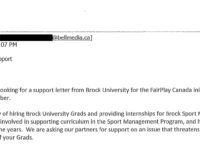Among the thousands of interventions at the CRTC to the Bell coalition website blocking plan, one of the submissions that stands out comes from Brian Hutchings, Brock University’s Vice-President, Administration. The submission claims that “Brock ardently supports the FairPlay Canada coalition” adding that “we are committed to assist the members of the coalition and the CRTC in eliminating the theft of digital content.” The submission sparked an immediate campus backlash. The Brock University Faculty Association filed a submission with the CRTC noting:
we stand in opposition to the intervention by Vice President, Administration on behalf of Brock University. Vice-President Hutching’s intervention was undertaken without consultation with the wider Brock University community, including faculty, librarians, and Senate; therefore, his submission should not be seen as indicative of the views of Brock University as a whole.












